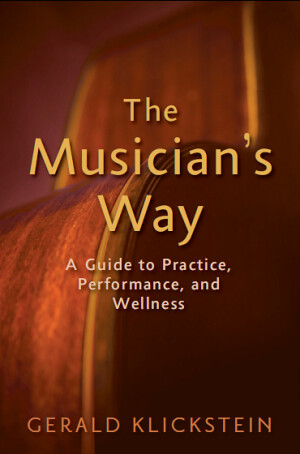 “Your habits in the practice room make you the musician that you are.”
“Your habits in the practice room make you the musician that you are.”
–The Musician’s Way, p. 20
Imagine being on stage, about to begin a performance: Are your thoughts typically focused, or does your mind race?
If you feel jittery, do you know how to attain a centered presence?
Disciplined mental habits in practice will lay the groundwork for you to direct your thoughts under pressure.
In contrast, if you routinely let your attention drift as you practice, then it’s questionable whether your mind will be steady when your stress level climbs.
Focused Mental Habits
To cultivate focused mental habits, set explicit practice goals, and then keep up a calm, alert disposition as you work.
Practice deliberately in all five practice zones, completing one small task after another.
If your attention wanes, take a break, and typically plan 5-minute breaks every 25 minutes.
Permanently say no to mindless repetition.
See The Musician’s Way for practice and performance strategies that have earned worldwide praise.
Related posts:
Awareness, Focus, Concentration
The Centered Performer
Habits of Excellence
The Twin Aims of Deliberate Practice
Upgrading Your Practice Habits
© 2015 Gerald Klickstein
Adapted from p. 23 of The Musician’s Way

Sometimes, for me, getting students the music they want entails me transcribing a particular pop song for them, that involves a lot of decisions for me about trying to be true to the original melody so the students can play along with the track (key, rhythm, register, etc) or transpose the piece to an easier key and with a simplified rhythm which will enable them to play it more easily. Sometimes giving them a very difficult transcription which is clearly beyond their current abilities is an excellent motivator, and sometimes it isnt, every student is a unique individual who responds to a wide range of positive or negative reinforcements- some will rise to the challenge and work their butts off to be able to conquer the piece and some will curl up in a little tearful ball and quit. One parent came up with an excellent motivator for her daughter (who was a very commercially minded girl), she paid her $5 for every day that she practiced on her own for 30 minutes or more- but at the end of the week the child had to pay for her lesson herself. Pretty quickly the student realized that if she practiced 7 days a week she would be turning a $10 profit weekly, and promptly doubled her efforts at home. Everyone is different, and part of our job as teachers is learning what makes each pupil tick, and helping them develop good discipline which will reward them with a wealth of achievements, both in music and life.